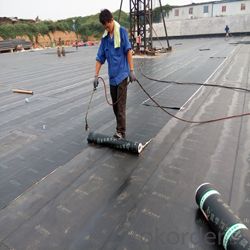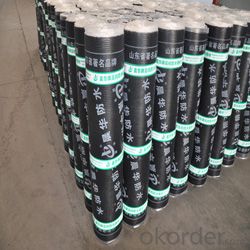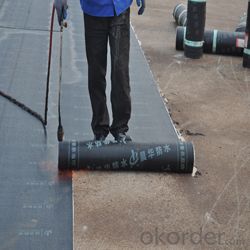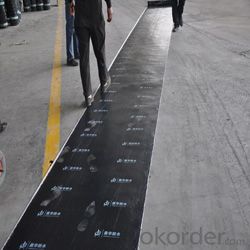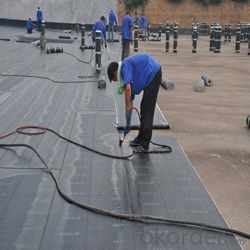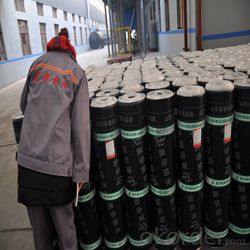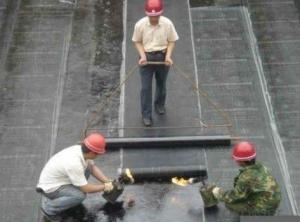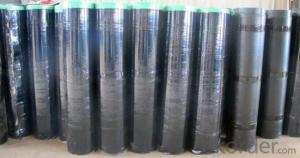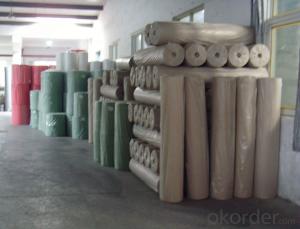APP modified waterproof membrane
- Loading Port:
- Qingdao
- Payment Terms:
- TT OR LC
- Min Order Qty:
- -
- Supply Capability:
- 120000 m²/month
OKorder Service Pledge
OKorder Financial Service
You Might Also Like
Specification:
Width:1m
Length/roll:7.5m/10m/15m or as your need.
Surface:PE film/Granules/Sand etc.
Thickness:3mm\4mm.
Characteristic:
a) SBS modified bitumen waterproof membrane is specially used as waterproof material in cold area
b) APP is specially suitable for areas of high temperature and of strong sun-shine
SBS/APP Modified Bitumen Waterproof Membrane
c)Good performance in good impermeability ,anti-puncture, anti-broker, anti-resistance, anti-erosion, anti-mildew, anti-weathering
d)Possess good tensile strength, elongation rate and size stability which could be well suited the substrate
distortion and crack
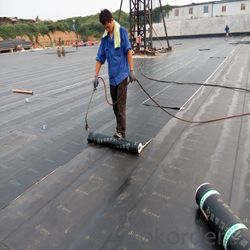
- Q: Can a waterproofing membrane prevent water leakage in basements?
- Yes, a waterproofing membrane can prevent water leakage in basements. A waterproofing membrane is a protective layer that is applied to the exterior or interior walls of a basement to create a barrier against water penetration. It can effectively prevent water from seeping through the foundation walls and causing leaks or moisture issues in the basement. The membrane acts as a waterproof seal, preventing water from entering the basement and protecting the structure from potential damage. However, it is important to note that the effectiveness of a waterproofing membrane depends on its proper installation and maintenance.
- Q: Are there any specific considerations for installing a waterproofing membrane on metal surfaces?
- Yes, there are specific considerations for installing a waterproofing membrane on metal surfaces. Firstly, it is important to ensure that the metal surface is clean, free from rust, and properly prepared before applying the membrane. Additionally, compatibility between the waterproofing membrane and the metal surface should be checked to ensure proper adhesion. It is also crucial to select a membrane that is designed to withstand the expansion and contraction of metal due to temperature changes. Lastly, proper installation techniques should be followed to ensure a watertight seal and prevent any potential damage to the metal surface.
- Q: Can a waterproofing membrane be used in conjunction with landscaping or hardscaping projects?
- Yes, a waterproofing membrane can be used in conjunction with landscaping or hardscaping projects. It can provide an additional layer of protection and help prevent water damage to structures or areas where landscaping or hardscaping is being done.
- Q: Can a waterproofing membrane be installed by a DIYer?
- Installing a waterproofing membrane can be done by someone who wants to do it themselves. However, it is important to keep in mind that the installation process can be complicated and requires careful attention to detail. It is crucial to thoroughly understand the instructions and guidelines provided by the manufacturer before attempting the installation. In addition, it is essential to properly prepare the surface in order to have a successful installation. This may involve cleaning, leveling, and priming the surface to ensure that the membrane adheres correctly. It is also important to choose the appropriate type and thickness of membrane for the specific application. Moreover, DIYers should have the necessary tools and equipment, like a trowel or roller, to apply the membrane accurately. Depending on the specific membrane and installation method, specialized tools may also be required in some cases. Considering safety measures is also important. It is recommended to wear protective gear and work in a well-ventilated area. Some waterproofing membranes may involve the use of hazardous chemicals, so it is crucial to follow all safety instructions provided by the manufacturer. If you are uncertain about your ability to properly install a waterproofing membrane, it is advisable to seek advice from a professional contractor who specializes in waterproofing. They have the knowledge and expertise to ensure a correct installation that will effectively protect your property from water damage.
- Q: Can a waterproofing membrane be covered or concealed by other finishes or materials?
- Indeed, other finishes or materials have the capability to cover or mask a waterproofing membrane. In fact, this practice is widely employed in construction projects. The primary purpose of a waterproofing membrane is to establish a barrier against water infiltration and safeguard the underlying structure. Prior to the application of other finishes or materials, it is typically installed on surfaces like roofs, foundations, or walls. Concealing the waterproofing membrane with other finishes or materials serves two key objectives. Firstly, it enhances the aesthetics of the structure. Whether it is a roof, bathroom, or basement, hiding the waterproofing membrane allows for the incorporation of more visually pleasing finishes such as tiles, paints, or decorative elements. Secondly, covering the waterproofing membrane provides an additional layer of protection. While the membrane itself is designed to be water-resistant, it may still be susceptible to damage from UV rays, foot traffic, or general wear and tear. By adding other finishes or materials on top, such as protective coatings, tiles, or concrete, the waterproofing membrane is shielded from potential harm, extending its lifespan and effectiveness. However, it is crucial to note that proper installation and compatibility between the waterproofing membrane and the covering materials are of utmost importance. The covering materials should not compromise the integrity of the membrane or create any weak points. Additionally, any penetrations or joints in the covering materials must be meticulously sealed to maintain the effectiveness of the waterproofing system. Therefore, while it is possible to cover or conceal a waterproofing membrane with other finishes or materials, it is essential to adhere to manufacturer guidelines and seek professional advice to ensure the overall integrity and performance of the waterproofing system.
- Q: Can a waterproofing membrane be applied on top of insulation materials?
- Applying a waterproofing membrane on top of insulation materials is possible. In fact, it is often advisable to install a waterproofing membrane over insulation materials to provide an extra layer of safeguard against moisture infiltration. This is particularly crucial in areas vulnerable to water damage, such as basements or places prone to heavy rainfall. The waterproofing membrane helps prevent water from seeping into the insulation, which could cause harm or reduce its efficiency. Moreover, the membrane acts as a barrier, inhibiting water vapor from penetrating the insulation and potentially causing condensation or mold growth. However, it is vital to ensure proper installation of the insulation materials and the presence of any required air gaps or drainage systems to avoid water from getting trapped between the membrane and the insulation.
- Q: Are waterproofing membranes suitable for high-traffic areas?
- Yes, waterproofing membranes are suitable for high-traffic areas. These membranes are designed to provide excellent durability and resistance against heavy foot traffic. They create a protective barrier that prevents water from seeping through and damaging the underlying structure. Additionally, waterproofing membranes can withstand the wear and tear caused by constant use, making them an ideal choice for areas with high foot traffic such as commercial spaces, parking garages, or outdoor walkways.
- Q: Can a waterproofing membrane be used in ponds or reservoirs?
- Yes, a waterproofing membrane can be used in ponds or reservoirs. These membranes are specifically designed to provide a barrier against water, preventing leaks and seepage. They are commonly used in various water containment applications, including ponds, reservoirs, and other water storage structures. Waterproofing membranes are typically made of durable materials such as rubber, PVC, or HDPE (high-density polyethylene). They are resistant to UV radiation, chemicals, and other environmental factors that can degrade the integrity of the membrane. This ensures long-lasting protection and prevents water from seeping through the structure. The installation of a waterproofing membrane in a pond or reservoir involves careful preparation of the surface, followed by the application of the membrane using appropriate adhesives or welding techniques. The membrane is typically applied to the entire surface area, including the walls and the base of the structure, to ensure complete water tightness. Using a waterproofing membrane in ponds or reservoirs offers several advantages. It helps to maintain the water level by preventing evaporation and leakage. This is especially important in arid regions where water scarcity is a concern. Additionally, it helps to protect the surrounding soil from water contamination and prevents the loss of valuable water resources. However, it is important to note that the selection of the appropriate waterproofing membrane should be based on the specific requirements of the pond or reservoir. Factors such as the size of the structure, the type of water it will contain, and the environmental conditions should be considered when choosing the right membrane. In conclusion, a waterproofing membrane can indeed be used in ponds or reservoirs to provide a reliable and long-lasting solution for water containment and prevention of leaks. With proper installation and maintenance, it can ensure the integrity and sustainability of the water storage structure.
- Q: Can a waterproofing membrane be used for historical buildings?
- Yes, a waterproofing membrane can be used for historical buildings. However, it is important to consider the specific requirements and characteristics of the building. Some historical buildings may have unique architectural features or materials that need to be preserved, so it is crucial to choose a waterproofing membrane that is compatible with the building's structure and aesthetics. Additionally, consulting with preservation experts and following proper guidelines is essential to ensure the long-term protection and conservation of the historical building.
- Q: How does a waterproofing membrane handle expansion and contraction of the substrate?
- To effectively handle the expansion and contraction of the substrate, a waterproofing membrane is engineered to be flexible and elastic. It can stretch or shrink in accordance with temperature changes or other factors without experiencing any damage or failure. The flexibility of the membrane allows it to adapt to the movements of the underlying substrate, ensuring its integrity and complete functionality. This adaptability is achieved by utilizing materials with excellent elongation properties, such as modified bitumen, rubberized asphalt, or synthetic polymers like PVC or TPO. Moreover, a waterproofing membrane possesses a strong tensile strength, which enables it to withstand the stress caused by expansion and contraction without tearing or breaking. This strength is paramount in preventing water infiltration or moisture damage to the substrate. Additionally, during the installation of a waterproofing membrane, it is common practice to overlap or interlock the membrane sheets. These overlapping seams provide added protection against any potential substrate movement. If the substrate expands or contracts, the overlapping seams allow the membrane to accommodate the movement while maintaining a continuous and watertight barrier. In summary, a waterproofing membrane is specifically designed to effectively manage substrate expansion and contraction. Its flexibility, high tensile strength, and overlapping seams work together to ensure its durability, reliability, and efficacy in preventing water penetration, even as the substrate undergoes movement.
Send your message to us
APP modified waterproof membrane
- Loading Port:
- Qingdao
- Payment Terms:
- TT OR LC
- Min Order Qty:
- -
- Supply Capability:
- 120000 m²/month
OKorder Service Pledge
OKorder Financial Service
Similar products
Hot products
Hot Searches
Related keywords






